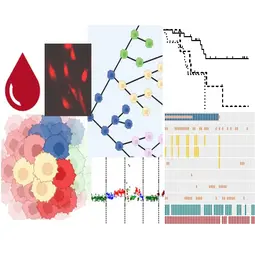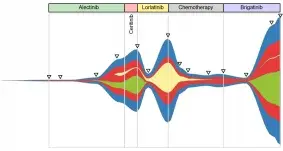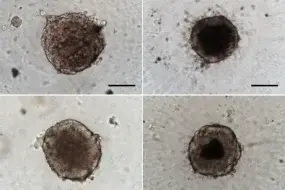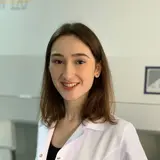Cancer Genome Research
- Functional and Structural Genomics

Prof. Dr. Holger Sültmann
Head of Division
The evolution of tumors is accompanied by molecular alterations on genomic, epigenomic, and gene expression levels. The aims of our research are to identify these molecular changes, to translate them into the diagnosis, prognosis and prediction of cancer at therapy response, and to understand their roles in the formation and progression of tumors.
Image: Research content Division Cancer Genome Research at DKFZ, © DKFZ, Abteilung Krebsgenomforschung

Image: Research content Division Cancer Genome Research at DKFZ, © DKFZ, Abteilung Krebsgenomforschung
Our Research
Our research comprises the genome-wide analysis of molecular alterations in various cancer entities with an emphasis on lung and breast tumors. To this end, we apply high-throughput technologies for DNA- and RNA-sequencing in tissues and blood samples („liquid biopsy“) and use the identified molecular markers for individual risk stratification and personalized clinical management of patients based on the tumor heterogeneity in space and time. To understand the roles of these molecular alterations in tumor progression and therapy resistance, we apply cellular 3D-coculture models as well as a variety of cell- and molecular biology methods.
Cancer cells differ from normal cells by their microenvironment, altered (epi)genomes, as well as gene and protein expression. The characterization of such changes in tumors and tumor stages is essential for understanding the mechanisms of tumor progression and the definition of molecular markers for diagnosis and prognosis. Tumor heterogeneity in space and time determines therapy success and patient survival. Therefore, we concentrate on precision medicine approaches in cancer research to address the following key questions:
tumor risk stratification with multimodal biomarkers
mechanisms of tumor progression and therapy failure
therapy response prediction using noninvasive approaches.
Projects

Liquid Biopsy for noninvasive tumor monitoring
We have augmented and extended our liquid biopsy approaches towards the establishment and application of liquid biopsy technologies for tumor monitoring and detection of minimal residual disease (MRD). To this end, we used ca. 500 longitudinal plasma samples from ALK-fusion-positive lung cancer patients (cooperation with the Thoraxklinik Heidelberg) as a proof of principle study to:
- determine single nucleotide variants (SNVs) and copy number variants in plasma DNA,
- correlate molecular data with clinical parameters like oligoprogression,
- show that the molecular lead time to progression under therapy is shorter compared to radiological lead time,
- identify epigenomic variants to detection tumor progression and MRD.
Further resources:
Tumoren mittels Blutprobe auf der Spur: https://www.youtube.com/watch?v=rpGLAdQBCdk
Methods for ctDNA detection and analysis: https://youtu.be/pwK1BTlQl6w
Cooperations:
- Div. of Oncology, Thoraxklinik Heidelberg
- Dept. of Pathology at Heidelberg University Medical Center
- Div. of Gynecological Oncology, NCT Heidelberg
- Div. of Molecular Genetics, DKFZ Heidelberg
- Div. of Radiooncology, Heidelberg University Medical Center
- Div. of Medical Oncology and Institute for Nutritional Medicine, University Clinic Schleswig Holstein, Campus Lübeck
Support: German Federal Ministry for Education and Research (BMBF) in the funding programs German Centers for Lung Research (DZL), OUTLIVE-CRC, and SATURN3

Spatial heterogeneity and therapy resistance in lung cancer
For many years, we have been cooperating with partners at the Thoraxklinik Heidelberg, working on different molecular alterations and clinical translation in lung cancer (“non-small cell lung cancer”, NSCLC). This has enabled us to obtain sustainable funding in the German Center for Lung Diseases (DZL), which provides a secure basis for our future translational lung cancer research. In cooperation with the Thoraxklinik, the Pathology Department Heidelberg and the Weizmann Institute of Science (Israel), we investigated the mutational and epigenomic heterogeneity of NSCLC.
Recent efforts investigating tumor heterogeneity and its influence on resistance to tyrosine kinase inhibitors (TKI) focussed on the establishment and application of 3D coculture models (spheroids of ALK-fusion-positive tumor cells with cancer associated fibroblasts (CAFs)). Using a combination of scRNA-seq, epigenomics, MS-based proteomics and metabolomics technologies, we identified several novel ligand-receptor interactions between CAFs and tumor cells.
Cooperations: Thoraxklinik Heidelberg; Dept. of Pathology at Heidelberg University Medical Center
Support: German Federal Ministry for Education and Research (BMBF) in the funding program German Center for Lung Research (DZL).
Team
The employees in the division have experience in molecular and cell biology, medicine, or AI-supported data analysis. Our goal is to investigate therapy resistance and translate molecular markers into clinical diagnostics.
-

Prof. Dr. Holger Sültmann
Head of Division
-

Dr. Isabell Berneburg
-
Priv. Doz. Dr. Petros Christopoulos
-
Michela De Meo
-

Simay Dolaner
-

Sabrina Gerhardt
-

Dr. Kate Glennon
-
Myesha Jahin
-

Dr. Florian Janke
-

Priv. Doz. Dr. Sabine Klauck
-
Dr. Astrid Laut
-

Simon John Ogrodnik
-
Luca Sebastian Schulte
-

Dr. Rebecca Schunk
-
Dr. Andrey Turchinovich
Selected Publications
Janke, F, Gasser, M, Angeles, AK, Riediger, AL, Görtz, M, Appenheimer, L, Laut, AK, Ogrodnik, S, Gerhardt, S, Stenzinger, A, Schneider, MA, Thomas, M, Christopoulos, P, Sültmann, H
Angeles AK, Janke F, Daum AK, Reck M, Schneider MA, Thomas N, Christopoulos P, Sültmann H.
Janke F, Angeles AK, Riediger AL, Bauer S, Reck M, Stenzinger A, Schneider MA, Muley T, Thomas M, Christopoulos P, Sültmann H.
The ICGC/TCGA Pan-Cancer Analysis of Whole Genomes Consortium.
Get in touch with us

